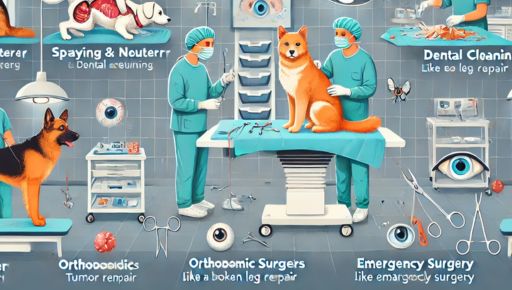
Surgeries performed at Richmond Hill are known as either urgent or elective care surgical processes. Understandably, when your beloved pet goes for surgery, you’re bound to get anxious about it. Therefore, a Richmond Hill veterinarian who devotes their practices to animals conducts surgery several times a week and offers the best surgical procedures based on their conditions.
The most devoted pet owners must be well-versed in all facets of their pets, sometimes defying veterinarians! Being an obliged pet parent, you must invest in pet insurance. Although surgeries must be too challenging for the pet owner’s incompetent eyes, knowing the fundamentals of pet surgery your four-legged furry baby is going through can assist you in dealing with every anxiety induced during the surgery. Below are the 6 common surgeries a vet performs on your furry companion.
- Dental surgery
Similar to humans, pets need dental surgeries at their old age. As cats & dogs are domesticated hunters, it’s challenging not to use their teeth aggressively, leading to frequent dental issues that might necessitate pet surgery. Dental surgeries for pets include tooth removal, cavity filings, and hassle-free processes, including clinical cleaning.
- ACL repair
This surgery is performed on a dog’s knee. Veterinarians make millions of dollars a year from this medical treatment alone. If your dog needs an ACL restoration, it should probably be done by a veterinarian surgeon because it is by far the most frequent surgical treatment performed by veterinarians. Expertise is always necessary for a successful outcome.
- Spaying & neutering surgery
Often, people need clarification about these two surgeries with keyhole one. The former focuses on pet sterilizations, and the latter focuses on curative or diagnosis treatment for pets. Sterilizing can assist your pet in the long run, which brings behavioral transformations to them and protects them from malignant infections in the reproductive organs. These two surgeries often need expert guidance and clinical experience in using sedatives.
- Laryngeal paralysis
It’s a common issue among aged dogs. Pet owners might diagnose its symptoms quickly even though they’re not qualified vets. Under such circumstances, the dog begins to breathe heavily, as though inhaling itself requires much energy. It’s due to the nerves in the larynx aren’t properly functioning. A top-notch larynx system would compress and expand significantly to back the breathing process. After laryngeal paralysis, these nerves don’t contract and expand, leading to chronic breathing problems. This surgery can be a bit complex; therefore, you must see a specialist who has conducted such surgical procedures before.
- Keyhole surgery
This surgery is done for curative and diagnostic purposes. The vet in Richmond Hills usually makes tinier incisions that don’t go beyond 1 cm, and they are used to insert an optical & electronic device, which can be used to treat somewhat hidden internal problems in pets. Here, the vet might suggest keyhole surgery for GDV, bladder ailments, and stomach twisting.
- Skin mass extraction
Dogs & cats gradually develop tumors underneath their skins as they grow older. Both creatures follow an agile lifestyle, and the sole method of measuring such tumors is by examining your pet manually or observing its lack of activeness regularly. The tumors are benign tumors, which are not considered derogatory since they don’t spread beyond one tissue and aren’t malignant. Although they can be pretty uncomfortable for your pet, it’s usually suggested that you get such tumors removed with the vet’s professional guidance. Such surgeries aren’t pretty tough but can provide maximum relief to your furry companion.
Conclusion
Before deciding whether to go with any type of surgery, your vet will thoroughly assess potential issues. Your pet’s health & age and possible complications from surgery will be considered while choosing whether to proceed with any surgery.